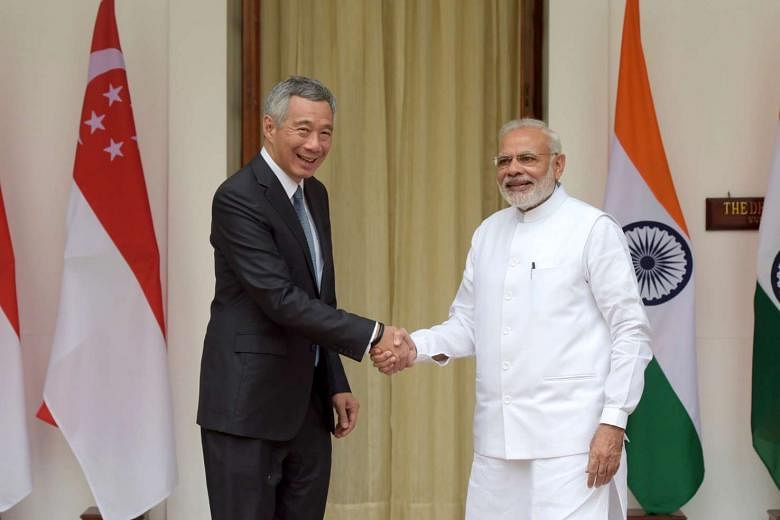India has made remarkable progress in recent years and holds many opportunities for Singapore, said Prime Minister Lee Hsien Loong yesterday as he wrapped up his five-day working trip to the country.
He encouraged Singapore businesses to seize the opportunities, saying cooperation with India will bring substantial benefits even if there are still "bottlenecks" that need to be eased.
"We believe that there are opportunities and we would like to work on it with them," he said.
Singapore has been stepping up cooperation with India in a number of areas such as smart cities and skills training, and both countries upgraded their bilateral relationship to that of a strategic partnership last November.
This trip gives those projects an extra push, said Mr Lee, who met his counterpart, Mr Narendra Modi, and called on President Pranab Mukherjee in New Delhi this week.
Giving an optimistic assessment of India's prospects, Mr Lee pointed to how Mr Modi - who came to power two years ago - is pushing several reforms and setting a new direction for the South Asian giant.
India began its economic liberalisation drive in 1990, but has not progressed as fast as some expected.
Asked by reporters if Singapore is "hedging its bets" on the country becoming an economic powerhouse, Mr Lee said: "I am trying to bet on all the good horses. And India, it has had fits and starts, but if you compare it to where they were back in 1990... I think they have made a lot of progress."
He cited the growth of India's economy by 7.5 per cent a year and its growing openness towards foreign investment.
This has drawn investment from Singapore to the tune of $19.4 billion in 2014, seven times more than the $2.6 billion in 2006.
Some joint projects that both countries have embarked on have also come to fruition, added Mr Lee.
For instance, Singapore was the master planner for Amaravati, the capital city of Andhra Pradesh state and one of the 100 smart cities Mr Modi wants to build. A consortium of Singapore companies is bidding to be the project's master developer.
Singapore has also worked with India to open two skills training centres in New Delhi and Udaipur, following Mr Modi's pledge to train 400 million people by 2022.
A third such centre is planned for the state of Assam.
PM Lee welcomed these developments, adding that he hoped both countries would work on making progress in other areas too.
The second review of the free trade pact between Singapore and India, known as the India-Singapore Comprehensive Economic Cooperation Agreement, began in 2010 and has not been concluded. Singapore hopes the review will be completed soon, said Mr Lee.
He also said he hopes to work towards the liberalisation of air services between both countries. "If you go to the provinces or states like Rajasthan, they are very keen on more air services because it means more tourism, more business for them," he added.
In an interview with The Hindu newspaper published yesterday, Mr Lee had acknowledged that India's complex system of rules and regulations at the state and federal levels could deter businesses keen on expanding into the country.
But, he said, despite the challenges, Singapore companies have invested in India, Singaporeans are working there, and Indian companies are likewise investing in Singapore and creating jobs for Singaporeans. "I think that the benefits are not always immediate but, if you look at it in totality, they are substantial," he said.
He added that the country has also become more open to foreign investment in sectors such as insurance and even defence. "There are still restrictions and we hope they are able to see their way to ease these restrictions as well," he said.
During his trip, Mr Lee had been asked by The Hindu to pick an animal that best describes India.
He replied: "I think the Indians consider themselves like an elephant. It moves not always the fastest, but inexorably."

